'It ain't easy right now': Hurricane Ida strands residents, wipes away landmarks on Louisiana island
BARATARIA, La. – Tess Coulon stands up on the bed of a flatbed trailer towed behind an all-terrain vehicle as it rolls to a halt, and she yells out to the house with muddy footprints in the driveway: "Hey! You need anything? We got water, hot meals, apples, bananas."
After a brief pause, a shellshocked man and woman appear on the deck. Offering thanks to Coulon, 52, and her small team of volunteers – mostly her own family and neighbors – the couple gratefully accept some chicken-and-rice stew made that morning 30 miles away in New Orleans, then driven, boated and ferried by ATV to their island home. Coulon’s teenage grandsons pile back onto the trailer behind the ATV, knocking mud off their rubber boots after carrying armloads of food and supplies to the couple.
"Thank you!" the woman yells to Coulon's team as the ATV putters off. "I'm so tired of eating junk food."
Hurricane Ida shoved a big fishing boat beneath the only bridge connecting Barataria to the mainland, twisting the decking like a Hot Wheels track, severing the road and further complicating a massive cleanup-and-recovery effort in this community of 1,200.
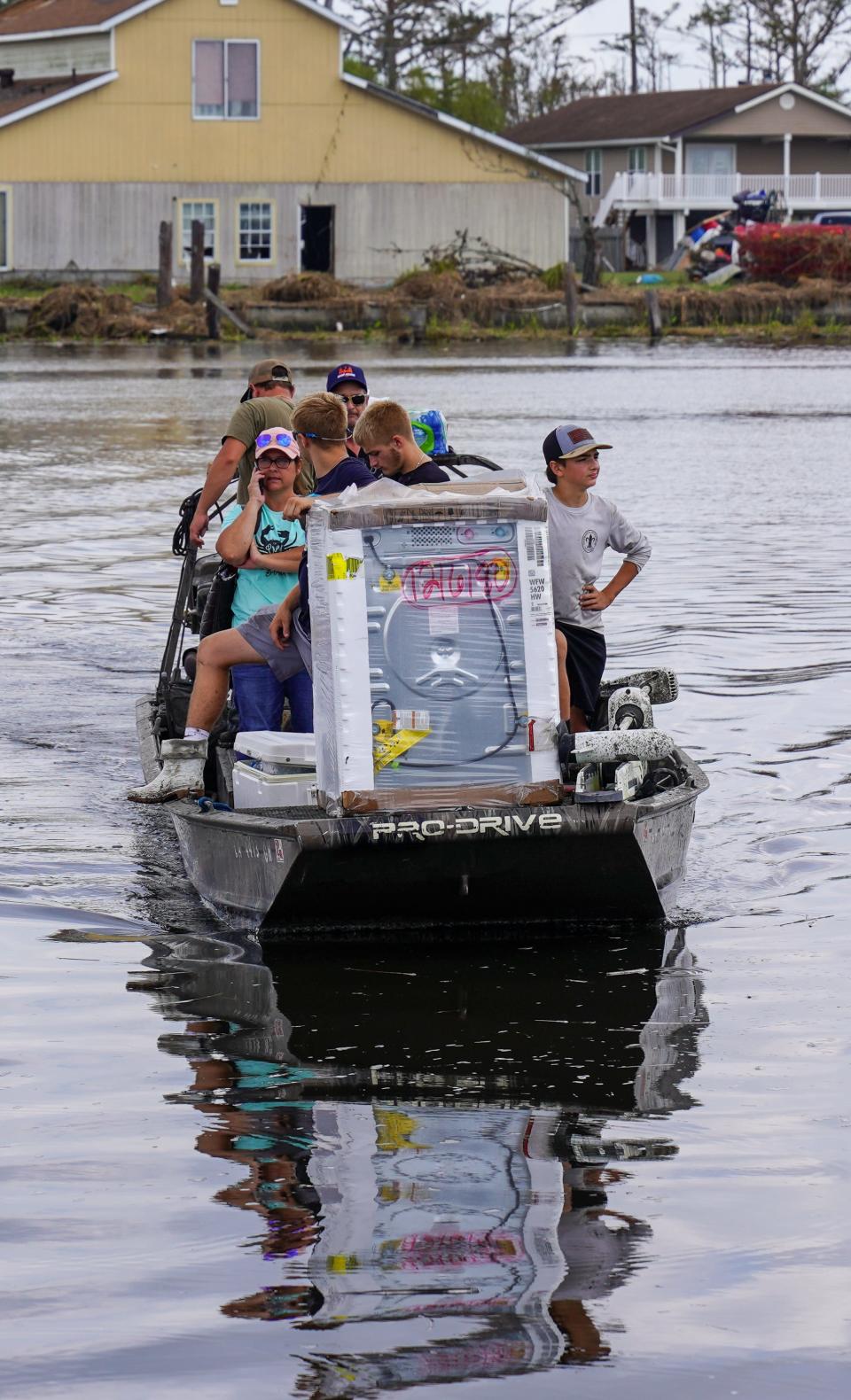
How to help: After Hurricane Ida, ways to volunteer, donate supplies, give funds
Post-storm, six houses burned down because firefighters couldn't get trucks to the island. As frustrations mount, gas is dwindling and tempers are flaring.
House by house, street by street, a small group of volunteers makes sure neighbors have food and water, boated in each day from the mainland and hand-delivered though the sticky, stinking mud blanketing the roads, sidewalks and driveways. Those deliveries even include food for a 44-year-old parrot named Kelly.
The convoy rolls on, meeting Stanley “Tick Tock” Helmer, 55, a boat captain. Helmer managed to make a supply run to the mainland, carrying back cigarettes and other necessities. He accepts a bottle of water from the convoy's cooler.
“This is life right now," he says, showing off the frosty bottle. "I mean, just to have a little cold water?”
Experts say prolonged exposure to heat and high humidity can be deadly, and not everyone on Barataria has a generator to run air conditioning or a fan. Generators themselves can be dangerous – at least four people in the greater New Orleans area have died from carbon monoxide poisoning, and more than 80 were taken to hospitals for treatment, Gov. John Bel Edwards said.
Coulon's convoy keeps hearing the same request: "We need ice."
Tuesday, she has none to offer. The Cajun Navy Relief is still sorting out the logistics of how to store and distribute thousands of bags of ice it acquired.
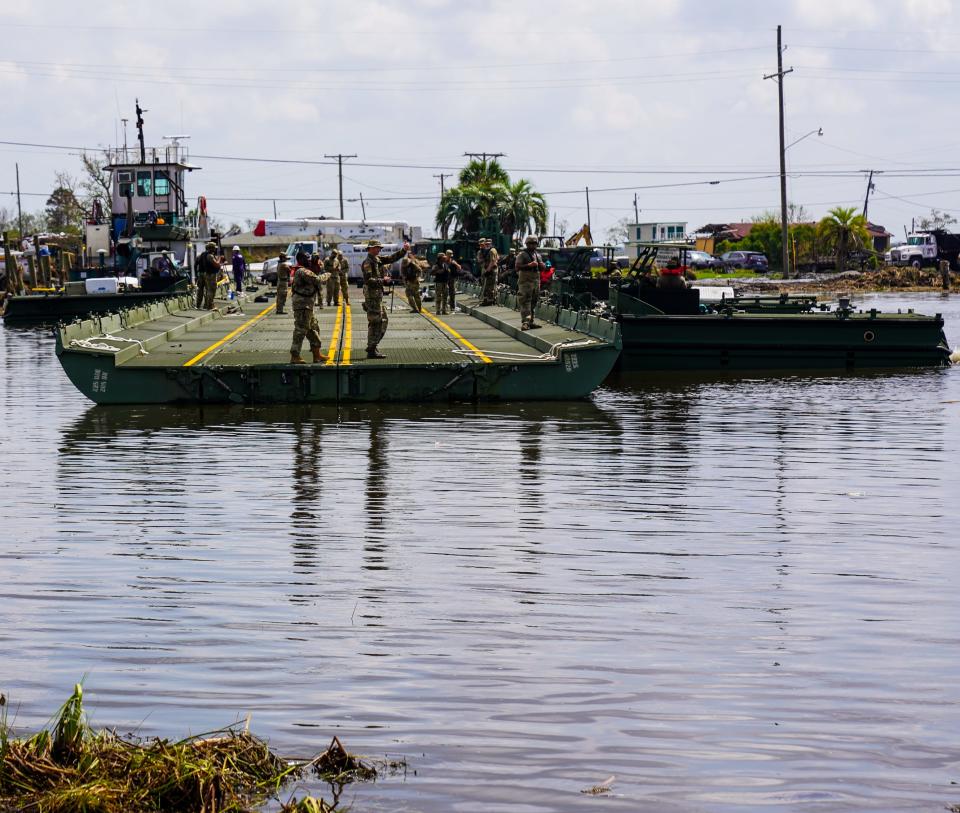
'It ain't easy right now'
For five years, Mark Wilson has lived happily among the bayous, canals and rivers of Jefferson Parish. Drawn to Barataria for its small-town feel, he loved rising with the sun to watch the fishing boats head out to the Gulf. A school bus driver like his wife, Wilson, 45, knows every inch of every road in the area.
“People work hard, and they give back," he says. "If anybody is struggling and doing bad, the whole community comes together to help them.”
He looks at the destruction around him: "They say it’s easy living down here, but it ain’t easy right now.”
Many members of Coulon's extended family live in Barataria. The family has its own graveyard. Under normal conditions, the island's main street, Privateer Boulevard, winds though stands of cypress trees and bushes covered in Spanish moss.
These are not normal conditions.
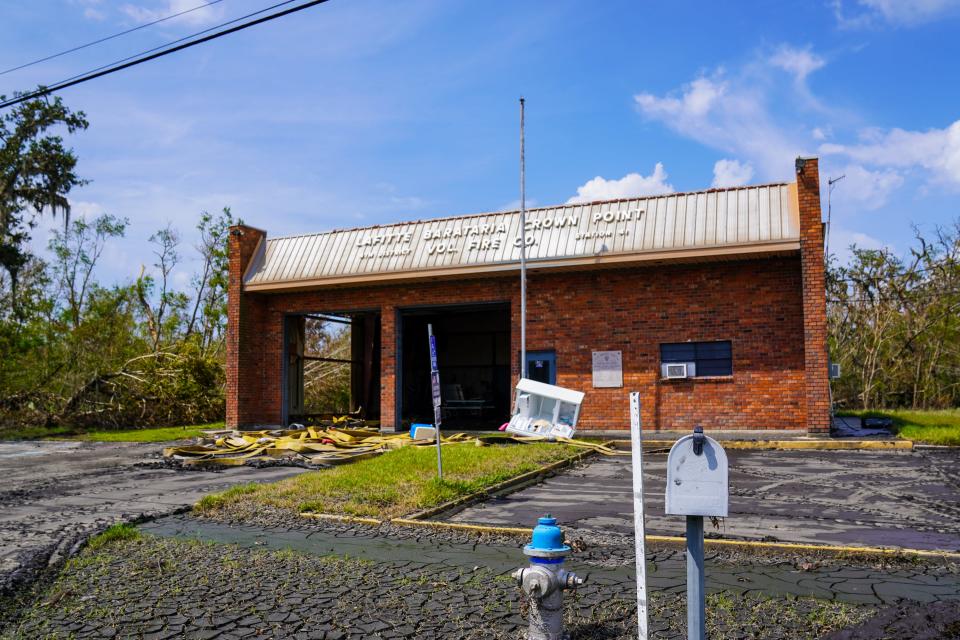
Hurricane Ida hit the coast Aug. 29 as a Category 4 storm, with winds hitting 150 mph. Those winds uprooted trees, flayed siding and roofs from houses and tumbled SUVs and boats. Pushed by the storm, a surge of water 8 feet high inundated Jefferson Parish, including the town of Jean Lafitte on the mainland and Barataria across the bayou. Many homes here sit on slabs, and the water shoved them down the road, relocating them to neighbors' yards after slopping nearly a foot of mud onto everything as Ida moved north.
Citing the extensive damage in coastal areas, power company Entergy says electricity may not be restored until Sept. 29, a full month after the storm's passage.
The rusting swing bridge connecting Barataria to the mainland – to the Piggly Wiggly, gas stations, school and the police station – is jammed shut. The Louisiana National Guard was building a temporary floating bridge Tuesday to access the island's south end. It remained unclear whether residents would be allowed to use it, or if it would be restricted to government vehicles and first responders.
“The only way to get across is the bridge we don’t have," says Darrin Coulon, 33, Tess Coulon's son.
Driving a four-wheeler through the mud, Darrin Coulon points out where his home used to sit and where it now rests, 100 feet away. Coulon, his fiancée and their kids, including their 5-month-old daughter, left the island before Ida hit. After the storm's worst passed, Tess Coulon put on her Trump 2020 hat and braved the floodwaters to retrieve Cheeto the cat and several hunting rifles from her son's house. Though the house had floated off its cinderblock footings, knickknacks were still sitting on the shelves, she says.
Darrin Coulon, who normally works as a swamp tour guide, returned to the island as soon as he could after the storm. Though he's happy his fiancée and their daughter are safe on the mainland, “I figured I’d be more use to people here instead of just sitting around waiting for the power to come back on.”
Baratarians such as the Coulons are more or less on their own. Although the National Guard built a bridge, it had virtually no patrol presence on the island for days, raising concerns among residents about looting. Many people openly carry pistols, and the Cajun Navy Relief, which has been ferrying people across, is careful to bring most visitors to Wilson's dock. The Jefferson Parish Sheriff's office has been patrolling, its deputies ferried across by boat or airboat.
“Nobody anticipated it to be this bad," Darrin Coulon says. “I mean, my house floated away. I’m sure glad I wasn’t it there when it happened.”
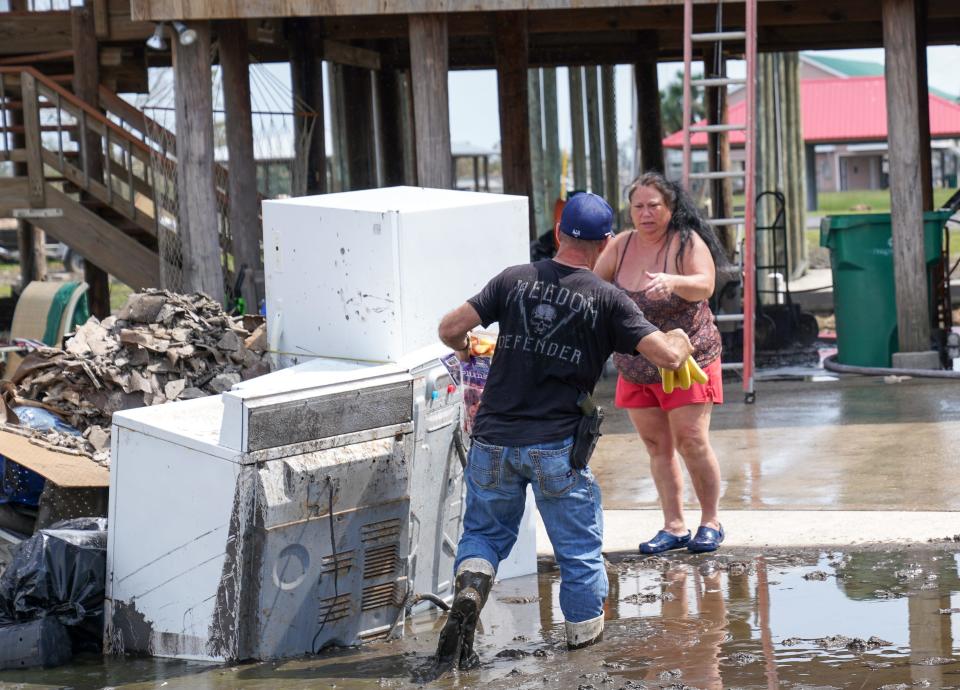
Tiny community sits beyond protection of levees
Tess Coulon and her caravan wind their way along Privateer Boulevard, stopping at any house where there are signs of habitation. She says maybe as many as 200 rode out the storm on the island.
Although Ida lashed New Orleans with high winds, the city escaped relatively unscathed, particularly when it came to floodwaters. Billions of dollars' worth of levees built or strengthened after Hurricane Katrina in 2005 did their job, keeping storm surge from inundating the historic city, parts of which sit 8 feet below sea level.
Most of Barataria is outside those levees, exposing the community to the storm's worst. Darrin Coulon says he couldn't imagine how bad it must have been – his house sat in that location for every one of his 33 years and was never affected by storms in this way before.
As he motors his ATV past the family cemetery, Coulon points out how some of the above-ground mausoleums and lawn crypts were knocked around by the waters and will need to be fixed. It's one more item on a long list of repairs, from fire hydrants to power lines to virtually every one of the island's approximately 500 homes. There's little sign of government assistance: no trucks from the Federal Emergency Management Agency, not even the Red Cross.
"My house has never flooded before. This is the worst it’s ever been," Coulon says. "I mean, we will literally have to rebury our dead."
Coulon owns vacant land where he hoped to build a bigger home for his family, and he's reassessing how high off the ground it will need to be. Many homes on Barataria sit on concrete pilings 10 feet or taller, raising them up from the minor flooding and storm surges the area gets every year. On the island's southern end, storm surge reached into even those houses, dirty water busting open doors and flooding inside.
Even knowing that climate change will probably make storms like Ida stronger and more frequent, Coulon says he'll stay. This is where he's from, and the land and water help define his life, from hunting and fishing to the summer rainstorms, and yes, the hurricanes.
“There’s natural disasters wherever you go. At least with a hurricane, they are kind of predictable, and you can get out of the way," he says. "I mean, tornadoes and earthquakes? No, thank you."
All around the island, residents who either stayed or returned quickly have begun gutting their houses – mold starts growing almost immediately under the hot, humid conditions, and it will colonize the entire home if the sodden carpet and clothes, dressers and drywall, aren't quickly removed.
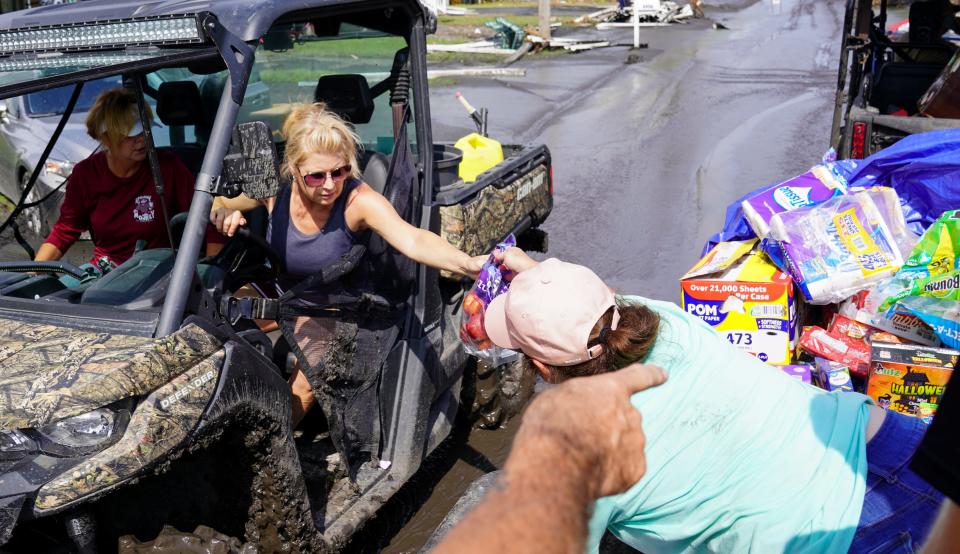
Earlier in the day, Nate Mook, CEO of World Central Kitchen, pulls up to a boat ramp across the water from Wilson's dock, unloading several boxes of hot meals, sandwiches and fresh fruit. Founded by celebrity chef Jose Andres, WCK uses restaurants in disaster areas to quickly prepare and distribute hot meals to survivors and has served more than 200,000 meals in Louisiana, simultaneously serving earthquake survivors in Haiti and Afghan refugees arriving at Dulles International Airport in Virginia.
“The need is just so great out there,” Mook says.
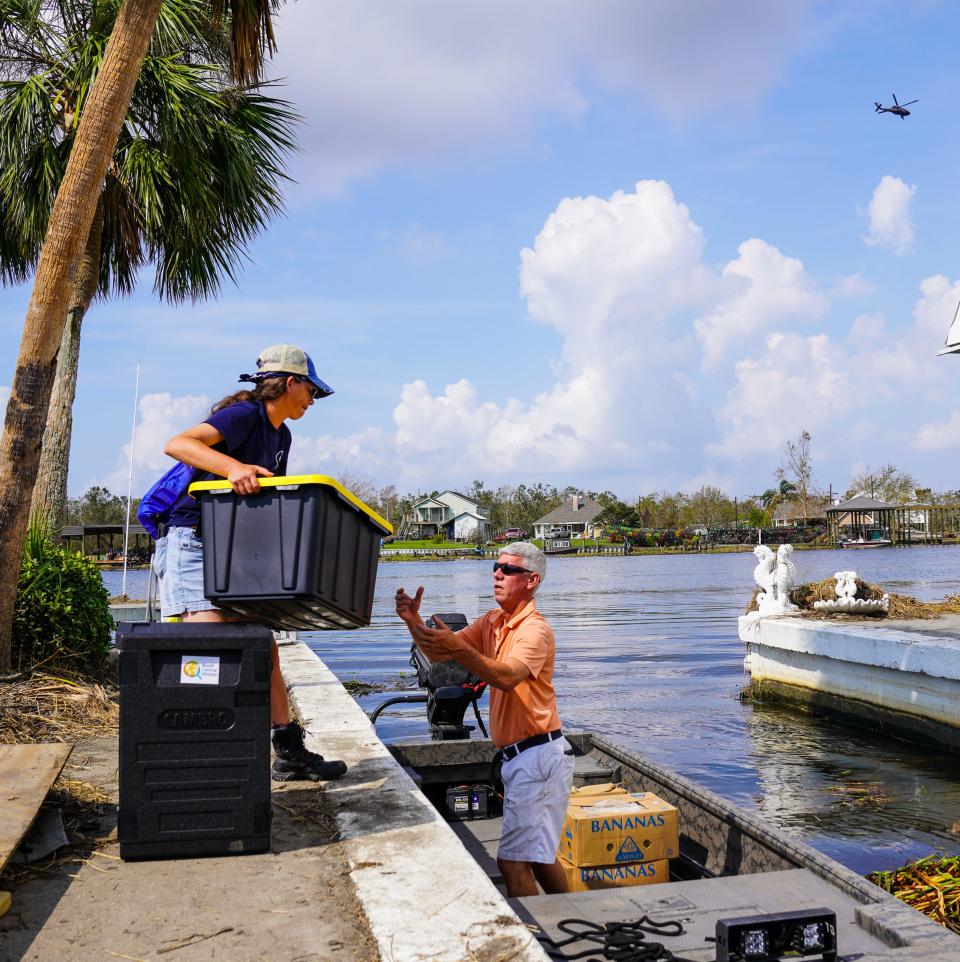
After carefully stacking the boxes on the boat ramp, Mook heads back to New Orleans, passing a small convoy of Cajun Navy Relief volunteers arriving to shuttle the food across to Barataria. The "navy" is a small group of boat owners who respond to water-related disasters in the Southeast, donating their time, fuel and boats to rescue people from flooding and assist with recovery efforts.
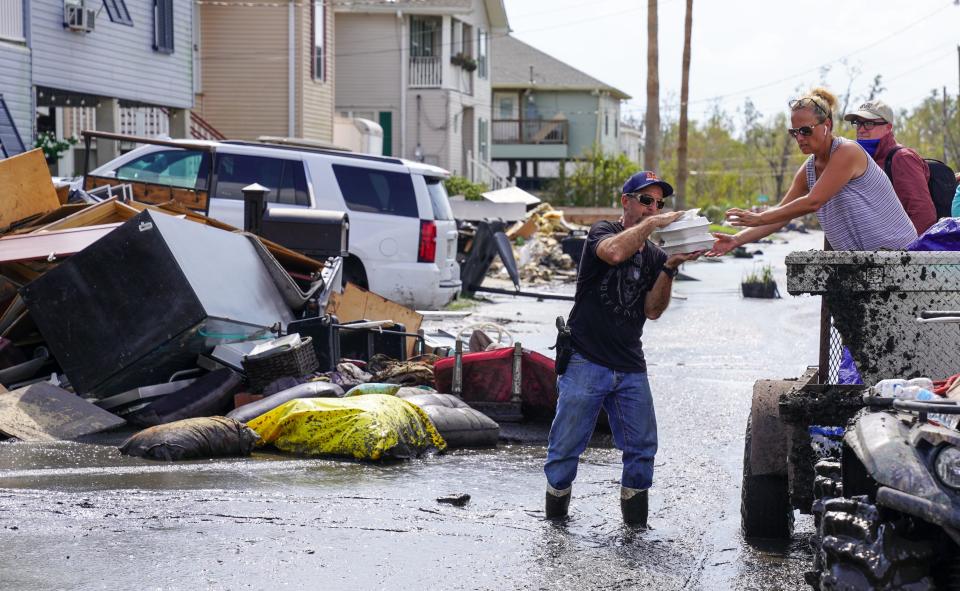
Tess Coulon's convoy rolls down another street, this one where her parents live. They come out onto the upper-level deck and shout down to answer a reporter's shouted questions. Coulon's father, Romeo Mamolo Jr., rode out the storm alone, swimming through the storm surge to adjust the lines on his fishing boat after the winds and water shoved an RV beneath it. Mamolo is 79.
“I was trying to save whatever I could save," Mamolo says. "And I’ll be here for the next one.”
Coulon shakes her head. Her mom went to the mainland during the storm.
“My dad would never leave. He’s hard-headed. And I guess I am, too, because I didn’t leave," she says. Like many residents, Coulon struggles with the trauma of seeing her world altered by Ida, from the roads to the trees to the sandwich shop that somehow floated away.
“That's probably the most depressing part, knowing that this town will never be same. The landmarks I knew as a child are all gone," she says.
This article originally appeared on USA TODAY: Helpers haul food, water to Barataria after Ida blocks mainland access

